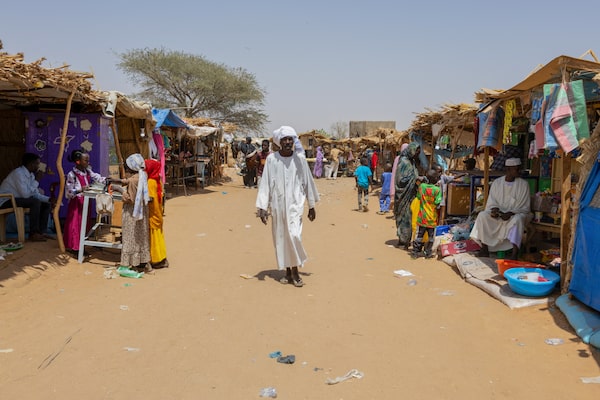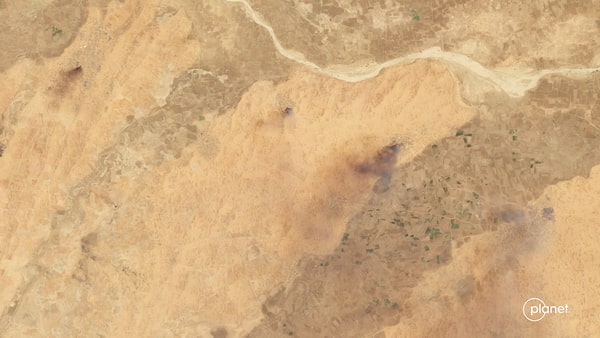
A man walks in the market of the Adre refugee camp in Chad, on April 10, 2024. Chad is home to the largest number of Sudanese refugees, nearly a million.JORIS BOLOMEY/Getty Images
At least nine communities in Darfur have been torched and destroyed since late March in a co-ordinated campaign of ethnically targeted violence by Sudan’s main paramilitary force and its allied militias, according to a new report based on satellite imagery.
The report by the U.S.-based Humanitarian Research Lab at the Yale School of Public Health said it “assesses with high confidence” that the villages were razed by the Rapid Support Forces (RSF) and its militia allies.
The arson attacks are an echo of a similar scorched-earth campaign in 2003 and 2004 by the Janjaweed, the horseback militia that later became the RSF. Those earlier attacks in Darfur led to genocide charges against Sudanese leaders by the International Criminal Court. Human-rights groups have warned that Darfur is suffering another genocide today.
The attacks between March 31 and April 15 targeted nine communities near El Fasher, capital of North Darfur region in the west of Sudan, triggering an exodus of displaced people. El Fasher is the only city in Darfur that has escaped capture by the RSF since the eruption of war in Sudan a year ago, and it is the main hub for humanitarian aid to the entire Darfur region.
The Yale report is based on satellite imagery and thermal-sensor data, corroborated by information from multiple other sources. “Each community exhibits visible thermal scarring consistent with an arson attack during the reported attack period,” it said.

Fires in communities to the west of El Fasher, the capital of North Darfur, were captured via satellite on April 13, 2024. Imagery by Planet Labs.Handout
Canada announces sanctions for Sudan war, months after other Western governments
The attacks are part of a “systematic targeting of Masalit, Fur, Zaghawa, and other non-Arab communities,” the report said.
Will Carter, the Sudan country director for the Norwegian Refugee Council, said it is likely that thousands of civilian homes were destroyed in the arson attacks.
“Plainly it’s inhumane; this destruction is unnecessary to accomplish any military purpose,” he said in a social-media post. “It’s a brutal pattern of violence against civilians that must be rejected.”
The RSF has launched an offensive to try to capture El Fasher, home to an estimated 2.8 million people, including 500,000 who fled to the city after violent attacks in other parts of Darfur.
A similar offensive last year in West Darfur led to the ethnically targeted massacre of 10,000 to 15,000 people by the RSF and its allied militia, according to a United Nations report.
There are fears of more atrocities in the renewed fighting. About 40,000 people have reportedly fled the latest attacks, but many more are trapped. “The RSF controls the major roads and junctions surrounding El Fasher which will likely prevent civilians from fleeing,” the Yale report said.
Dozens of people have been killed in shelling by RSF forces in recent days, including displaced people living in camps around El Fasher. Civilians have also been killed when warplanes from Sudan’s air force have launched strikes aimed at RSF positions in the city.
UN and U.S. officials have voiced alarm at the reports from Darfur. “Twenty-one years since pictures of burned-out villages became synonymous with Darfur, villages are still being destroyed by Arab militias,” said Toby Harward, the UN deputy humanitarian co-ordinator for Sudan, in a social-media post in which he highlighted several photos of the smouldering ashes of destroyed homes in one village.
The U.S. special envoy to Sudan, Tom Perriello, in another social-media post, warned that the continued fighting in El Fasher “risks significant civilian harm and a worsening displacement crisis when people are already in desperate need of food, water and medicine.”
An independent investigation by a Montreal-based group, the Raoul Wallenberg Centre for Human Rights, reported this week that there is “clear and convincing evidence” that the RSF and its allied militias are committing genocide and inciting genocide in Darfur.
“A mere twenty years after the first genocide of the 21st century unfolded in Darfur, the same perpetrators are committing the same atrocities against the same targeted groups with impunity,” the report said.
“The RSF is carrying out systematic attacks and atrocities in West Darfur targeting non-Arab Masalit members. The only reasonable inference to be made from these patterns is an intent to destroy the Masalit group in whole or in part.”
The non-Arab ethnic groups in Darfur are now “in a state of extreme vulnerability, without any force willing or able to protect them,” the report said.
The main difference from the 2003-04 genocide in Darfur is simply that the RSF today is more destructive, with more advanced technology and sophisticated weaponry, it said.
“The RSF follows the same systematic pattern and policy throughout its attacks, through door-to-door searches, checkpoints, and torture sites, interrogating and screening victims for their ethnicity, and singling out Masalit men and boys to be summarily executed at close range, while allowing others to pass,” the report said.
“The RSF has designated public sites to be used as killing grounds and has used consistent killing methods against non-Arab victims, often of extreme brutality.”
 Geoffrey York
Geoffrey York